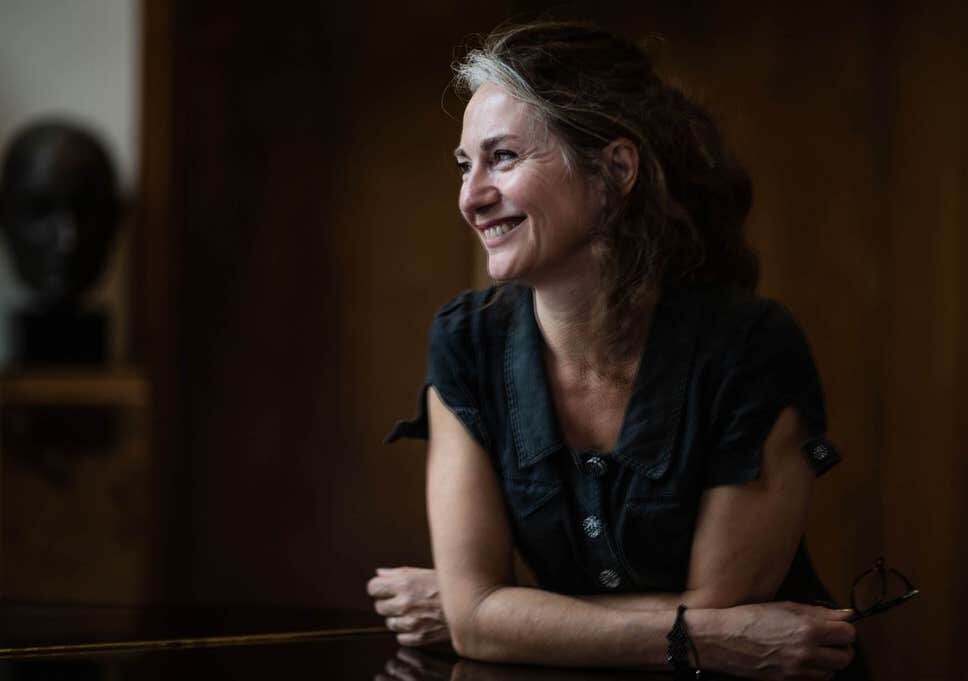By Nikki Owen
From Issue #30 September 2017
Words. Words can fly off the page and create such magical worlds that, often, it’s hard to believe they are not real. And yet, they sing to us, don’t they? They sing to us, words on such a level that we start to step back, we start to think about life and love and the way in which we view each other. And in that context, I give you the wonderful writer of words that is, Rachel Joyce.
I met Rachel one Friday at the Star Anise cafe, and I’m going to admit now that I am a big fan. Huge. I’d read Rachel’s first, bestselling novel, The Unlikely Pilgrimage of Harold Fry, several years back when it first came out, and I was blown away. Here was a novel about real people. I knew Harold was made up, and yet he seemed so life like, so true. This is the talent of a good writer: to be able to create worlds that not only do you feel you can touch, but worlds that touch you. And in Rachel’s latest book, The Music Shop, souls and hearts are most definitely touched, and not simply by words, but by melody and song, too.
The Music Shop is set in 1988 and centres on a man named Frank, who owns a music shop. It is jam-packed with records of every speed, size and genre. Classical, jazz, punk – as long as it’s vinyl he sells it. Day after day Frank finds his customers the music they need. Then into his life walks Ilse Brauchmann. Ilse asks Frank to teach her about music. His instinct is to turn and run. And yet he is drawn to this strangely still, mysterious woman with her pea-green coat and her eyes as black as vinyl. But Ilse is not what she seems. And Frank has old wounds that threaten to re-open and a past he will never leave behind. It’s a novel about learning how to listen, learning how to feel and it’s something that Joyce does extremely well, but crucially, as with her other books, it’s the sense of community that proves to be both the catalyst and the saviour to people’s lives. In fact, a local, Rachel actually did a lot of her research at The Trading Post in Stroud, chatting to the owner, Simon, and observing what happened in the shop.
Rachel herself is unassuming, long, flowing brown hair, petite frame, with a gentle manner and a kind, bright smile. And yet, considering the enormous success of her career to date (she’s a Sunday Times best selling novelist, long listed for the Man Booker Prize and published in over 30 languages, plus is also an established writer in radio and has written over 20 original plays for Radio 4, dramatising both classic and new novels, and has written a period drama for BBC television) Rachel queries her success. “I have doubts all the time,” she says when I ask her about how she felt when The Music Shop was about to come out. “You always have that worry of how it may go – it’s an odd time.” Certainly, we all have doubts, but for Rachel, it’s today’s world of social media – and how it affects people - that both concerns her and interests her. “The worry these days is that there are so many opportunities to remain alone, and if you are introverted, you could quite easily get lost - social media contributes to that.” Rachel revealed that she not big on social media. “It’s not good for me. I think you have to keep a little bit of yourself back. This constant narrative - people commenting on themselves – it takes you outside yourself. I think it’s important to keep dignified and happy - that’s why community is important, real life. It’s about taking your place in a real way and be with real people.”
To that very end, community is at the heart of The Music Shop novel – community and, of course, music. So what, I asked Rachel, sparked the idea for the book, a book that, excitingly, is accompanied by its own Spotify playlist. “Fourteen years ago, I moved out of London. My husband, Paul, he couldn’t sleep. He was in this music shop in Cheltenham, and Paul happened to tell the owner of his sleeping issue. And the owner went and found a CD to help – it was classical music, and it began a journey in my head: a man with gift for music. It stayed in my mind. I went back years later to the shop, but it had gone.” The fact that the shop had disappeared proved poignant to Joyce’s novel – the fictional Unity Street in The Music Shop is under threat from developers. Indeed, the theme of modernization – and what we do with the past - runs strong in the novel. Said Rachel, “We bought a record player few years ago. It’s such a physical thing, that taking off the record and turning it over, it’s magical. That’s why the novel is set in 1988 - the year when vinyl is taken over by more modern CDs. To me, this meant everyone was going to throw away what they had, and it made me think: you have to be very careful about what you chose to lose.” What you chose to lose. Wow. Yes. For a second, after Rachel said that, I just sat in thought, thinking about her words. Make no mistake – Joyce has a knack of making you stop and think – whether it’s spoken, written or set to music. It’s amazing - no wonder she’s so successful.
I finish the interview with Rachel telling me that her next novel will be based in a small hamlet, possibly in France, in a mountain landscape, post world war in a remote community. And as I listen to her, one thing becomes very clear: Rachel Joyce knows that to create a reality in the world of words, you can’t just sing one tune – you have to create an entire symphony. Because you see, do that, and you have produced a fictional world that sings not only to the mind, but to the soul. And, at the end of the day, isn’t that what we all want?
The Music Shop is out now via Penguin and available in all good independent book stores and on-line. Click here for further info…
Nikki Owen is an author and writer. Her third and final book in the Project Trilogy – The Girl Who Ran (Harper Collins), is out now. Follow her on twitter @nikkiwriter and nikkiowenauthor.com

